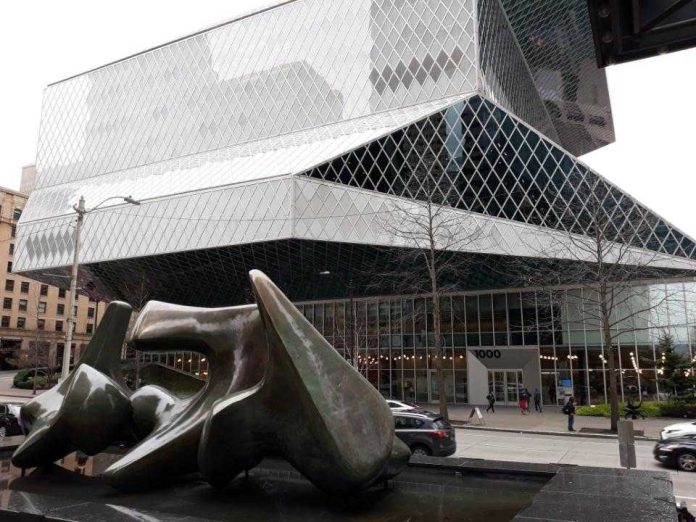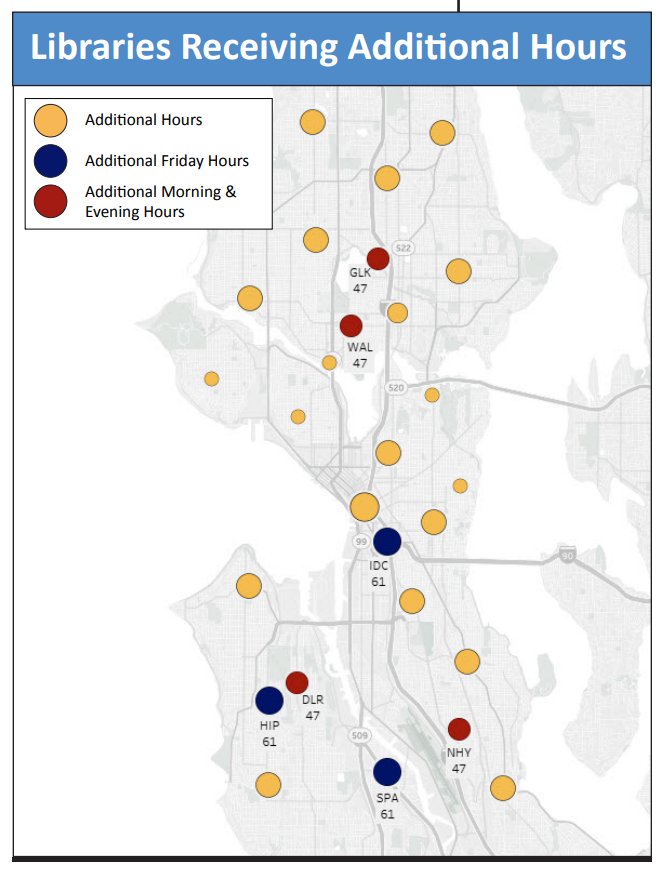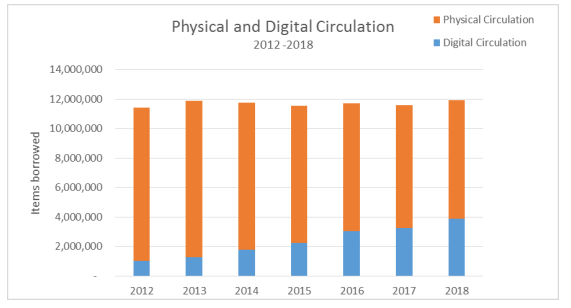
Last week, Seattle got a look at the proposed update to the Seattle Public Library’s capital and operations levy, replacing the one expiring this year. While the new levy proposal expands access, it should go even further.
The proposal is mostly a necessary continuation of vital programs offered by the Seattle Public Library: the expiring levy, approved in 2012 at $123 million over seven years, would need to increase to $167 million just to provide the same amount of services for 2020-2026. The mayor’s proposal would add an additional $45.9 million to fund a small set of additional operating and capital projects, or less than $7 million per year. That extra funding is getting devoted to a few different areas of focus.
Added Operating Hours
Currently several Seattle Public Library branches are closed on Fridays, one last vestige of an earlier period of austerity at the library. The levy would reopen the New Holly, Green Lake, Delridge, and Wallingford branches on Fridays.

In addition, several branches have abbreviated hours compared to larger ones: South Park, International District, and High Point would see additional morning hours (some days those branches open at 1pm) and evening hours (some days they close at 6pm).
All other branches would see an increase of only one hour per week, opening at noon on Sundays compared with the current 1pm. The Central Library would not see any additional hours according to the current proposal, since it opens at 12pm on Sundays currently.
The levy proposal would not, however, bring all library branches up to the same hours, with areas serving marginalized communities like the South Park branch not being open as many hours as branches like Ballard or Capitol Hill. The City’s modest levy proposal doesn’t propose filling those gaps in access to library service, much less making full access citywide a goal.
Several library systems (like Minneapolis, San Francisco, and Vancouver, BC) are extending hours until 9pm at some branches to accommodate the schedules of working families, for example. Libraries throughout the King County Library System already meet this standard (not to mention openings at 10am nearly every day), even in small communities like Enumclaw. No Seattle Public Library branch is open that late any day of the week.
The levy also permanently funds two security officers that had been added in the 2019 general fund budget but not the 2020 budget. In 2019, this was $194,500 for the year, so it should make up around $1.5 million over the life of the levy. The additional security staff allows four security officers to be on staff at the Central Library at all times, according to the 2019 budget.
The data on who gets excluded from the library based on “code of conduct violations” is worth digging into, as Erica C. Barnett did last year.
Eliminating Overdue Fines for Print Materials
One relatively small line item is grabbing a lot of attention: the proposal to eliminate overdue fines for print materials. Just over $1 million per year in proposed levy funds would go toward filling the line item currently occupied by late fees.
From an equity standpoint, eliminating fines is a no-brainer. Flat 25-cents-a-day late fees are regressive, and the fine structure itself can be a deterrent for lower income people to use the library system at all to check out materials.
Over a third of the accounts at Rainier Beach, New Holly, South Park, and Delridge branches are currently locked due to cumulative fines over $15. Without continual fine amnesty, these patrons are unlikely to return to circulating materials.

Seattle is following a national trend on eliminating fines, which has now been proven to improve access to public library materials: library systems in Bremerton, Port Townsend, Friday Harbor, and Marysville have all eliminated fines in recent years, as well as library systems in major cities like Nashville and San Diego.
Fines in general have become a declining revenue source for the library, with the transition to digital materials, which don’t accrue fines but instead simply stop functioning after the check out period has ended. The hit to the bottom line should continue to go down the longer the no fine policy is in place.

Additional Investments in Technology
A new levy would continue the Seattle Public Library’s investments in digital access to all citizens, fulfilling one of its most important functions. Desktop computers at branches continue to be a major way that a segment of Seattle residents access the internet, with the computers taking a lot of wear-and-tear in the process.
Recent data showed that in 2018, in-person computer sessions at library branches were down 38% compared to 2012 (pre-levy) levels, but this doesn’t include patrons using WiFi at branches, nor does it include the HotSpot program, which since 2015 has provided three weeks of internet access for use at home. According to a 2018 survey, 42% of patrons who checked out a HotSpot did not have internet access at home, a population segment that is only 5% of the general population.
The library has added laptops and tablets that can be checked out and used in the branch, allowing more flexibility than the desktop stations. Moreover, it has started setting aside dedicated hotspots for use in Seattle’s sanctioned homeless encampments, as an alternative to a discarded proposal to install permanent WiFi at the camps.
An additional $715,000 in levy spending per year would allow these services to continue to expand to meet the needs of citizens. This amounts to $5 million across the levy’s seven years.
Seismic Upgrades to Library Buildings
The proposed levy also includes capital funds for building improvements at three branches, to provide seismic reinforcement: Columbia City, Green Lake, and the University branches were all Carnegie endowment libraries and are some of the oldest branches in the system. $13.9 million of the $46 million in additional funds would go towards ensuring they don’t collapse in an earthquake. That’s almost a full third of the proposed levy increase amount. Considering Seattle’s backlog of reinforcing outdated buildings, ensuring our libraries, which could serve crucial post-distaster functions, stay standing seems like an obvious call.
Unlike what the rhetoric coming from the troglodytic Seattle Times Election Board would like you to believe, this proposal is very modest. More modest, perhaps, than the citizens of the city of Seattle deserve. Relying on a volatile revenue source like real estate excise tax (REET) to operate our critical library system is a recipe for further system cuts down the line. We’ve been there before, and it’s clear that Seattleites values their libraries too much to allow it to happen again.
Ryan Packer has been writing for The Urbanist since 2015, and currently reports full-time as Contributing Editor. Their beats are transportation, land use, public space, traffic safety, and obscure community meetings. Packer has also reported for other regional outlets including BikePortland, Seattle Met, and PubliCola. They live in the Capitol Hill neighborhood of Seattle.

